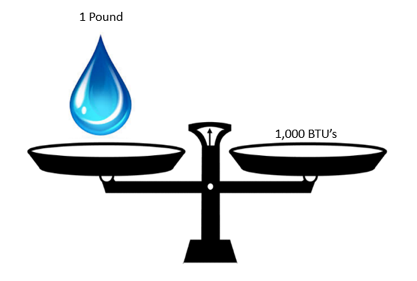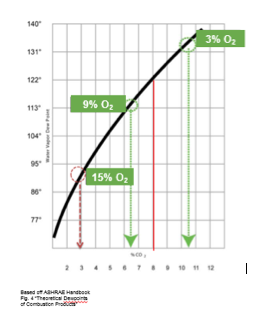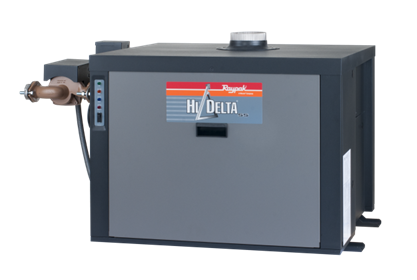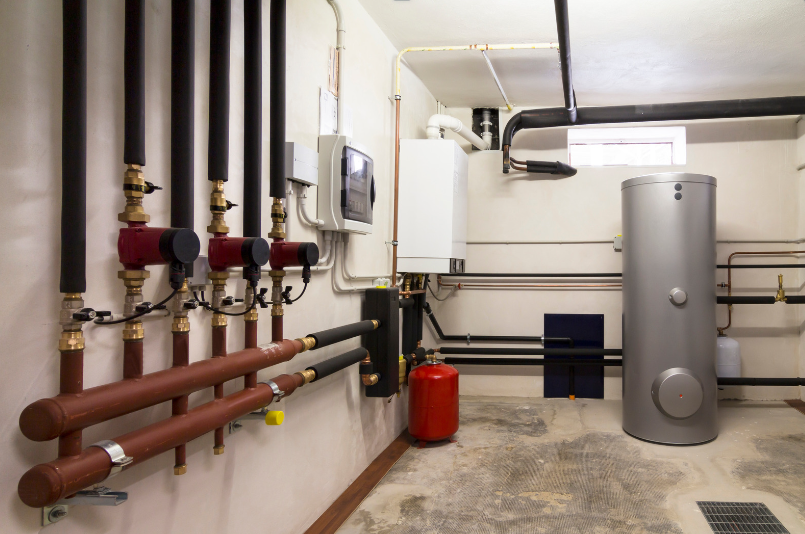Oxygen matters. Every living organism on earth needs it in one form or another. While a high efficiency condensing boiler isn’t necessarily a living thing, it does work in a system that requires appropriate amounts of oxygen to operate at optimum levels. In that way, high efficiency boilers are a lot like you and me.
So, how does it work?
 Condensing occurs when water vapor changes into liquid. For every pound of water vapor condensed there is approximately 1,000 BTU’s of latent energy. Condensing extracts that latent energy from the combustion exhaust gas and heats the water with it, increasing overall boiler efficiency.
Condensing occurs when water vapor changes into liquid. For every pound of water vapor condensed there is approximately 1,000 BTU’s of latent energy. Condensing extracts that latent energy from the combustion exhaust gas and heats the water with it, increasing overall boiler efficiency.
High efficiency boilers require combustion gas calibration at start up. All manufacturers outline in detail the process in their installation manuals. Manufacturers calibrate the equipment at the factory. Recalibration as part of initial start-up is necessary due to changes in the local altitude, gas BTU content, gas supply piping and supply regulators. If the combustion gas isn’t recalibrated at the installation, the unit will never perform to the expected levels. The limitation of this practice is the technician can only adjust the air/fuel mix for the operating conditions at that exact time.
Advanced combustion control systems need to maintain precise air-to-fuel ratios to maximize efficiency. Equipment can often deviate from the ideal air/fuel ratio due to environmental variations such as humidity, atmospheric pressure, gas energy content, etc.
Optimal oxygen levels provide maximum efficiency and greater savings. As the level of oxygen available increases, the exhaust gas dew point decreases. The lower dew point means the unit will only be in condensing mode when very low temperature water is returned to it (see chart). There are no high efficiencies or savings when the unit isn’t condensing.
 Conversely, as the level of oxygen decreases the exhaust gas dew point temperature increases, driving the required return water temperature higher. The boiler will operate in condensing mode, at highest efficiency, more of the time.
Conversely, as the level of oxygen decreases the exhaust gas dew point temperature increases, driving the required return water temperature higher. The boiler will operate in condensing mode, at highest efficiency, more of the time.
There is a diminishing returns effect in oxygen content and performance for the unit. Too much available oxygen will lead to inefficient combustion. Over time, the unit will require unscheduled maintenance. Too little available oxygen causes unstable combustion and increased emissions. This will lead to flame loss faults and, once again, unscheduled maintenance.
What if we had a certified technician standing next to the unit continuously monitoring and adjusting the air/fuel mix ratio? This would guarantee the unit is operating at peak levels regardless of the operating condition variables or load. AERCO’s patented AERtrim technology makes this possible. AERtrim monitors the oxygen levels and real-time conditions in the combustion chamber then self-adjusts to bring the oxygen level to the optimal level for those conditions. Additionally, as the heating load decreases and the unit turns down, AERtrim can keep the unit operating in the peak condensing mode increasing the efficiency even further.
AERtrim ensures the unit is always operating in peak range, providing the owner with the high level of performance and maximum energy savings they were expecting.
With a built-in trim technology, you’ll get increased reliability and better efficiencies along with lower emissions and the premium environment for condensing to occur.
Increased reliability, better efficiencies and lower emissions sound like the perfect level of success in condensing boiler world. Make sure your boilers are getting the oxygen they need.
Click on the video below to learn more about AERTrim offered on AERCO's Benchmark Platinum boilers.









Submit a Comment